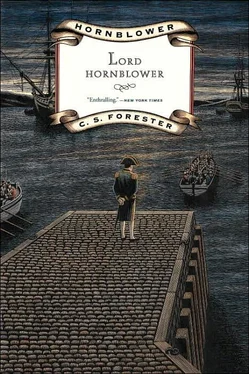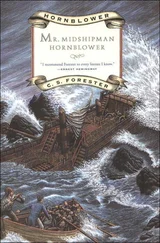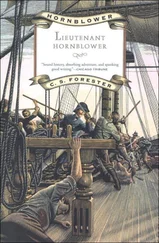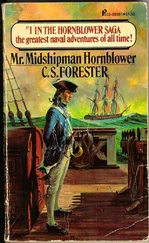He woke later feeling refreshed and hungry, listened benevolently to the tumult of the noisy ship about him, and then poked his head out of the blankets and shouted for Brown. The sentry outside the cabin door took up the cry, and Brown came in almost immediately.
“What’s the time?”
“Two bells, sir.”
“In which watch?”
“Afternoon watch, sir.”
He might have known that without asking. He had been asleep for four hours, of course—nine years as a captain had not eradicated the habits acquired during a dozen years as a watchkeeping officer. The Porta Coeli stood up first on her tail and then on her nose as an unusually steep sea passed under her.
“The weather hasn’t moderated?”
“Still blowin’ a full gale, sir. West-sou’west. We’re hove-to under maintopmast stays’l and maintops’l with three reefs. Out o’ sight o’ land, an’ no sail visible neither, sir.”
This was an aspect of war to which he should have grown used; endless delay with peril just over the horizon. He felt marvellously fortified by his four hours’ sleep; his depression and his yearning for the end of the war had disappeared, not eradicated but overlain by the regained fatalism of the veteran. He stretched luxuriously in his heaving cot. His stomach was decidedly squeamish still, but, rested and recumbent as he was, it was not in active rebellion, whatever it might promise should he become active. And there was no need to be active! There was nothing for him to do if he should rise and dress. He had no watch to keep; by law he was merely a passenger; and until this gale blew itself out, or until some unforeseen danger should develop, there was nothing about which he need trouble his head. He had still plenty of sleep to make up; probably there were anxious and sleepless nights ahead of him when he should come to tackle the duty to which he had been assigned. He might just as well make the most of his present languor.
“Very good, Brown,” he said, imparting to his voice the flat indifference after which he always strove. “Call me when the weather moderates.”
“Breakfast, sir?” The surprise in Brown’s voice was apparent and most pleasurable to Hornblower; this was the one reaction on his restless captain’s part which Brown had not anticipated. “A bite o’ cold beef an’ a glass o’ wine, sir?”
“No,” said Hornblower. His stomach would not keep them down, he feared, in any case.
“Nothing, sir?”
Hornblower did not even deign to answer him. He had shown himself unpredictable, and that was really something gained. Brown might at any time grow too proprietorial and too pleased with himself. This incident would put him in his place again, make him not quite so sure of his acquaintance with all his captain’s moods. Hornblower believed he could never be a hero to Brown; he could at least be quirky. He gazed placidly up at the deck-beams over his nose until the baffled Brown withdrew, and then he snuggled down again, controlling an expostulatory heave of his stomach. Contented with his lot, he was satisfied to lie and doze and daydream. At the back of the west wind a brig full of mutineers awaited him. Well, although he was drifting away from them at a rate of a mile or two in the hour, he yet was approaching them as fast as it was in his power to do so. And Barbara had been so sweet.
He was sleeping so lightly at the end of the watch that he was roused by the bos’un’s calls turning out the watch below, a sound to which he should have been thoroughly used by now. He shouted for Brown and got out of bed, dressing hurriedly to catch the last of the daylight. Plunging out on deck, his eyes surveyed the same desolate scene as he had expected—an unbroken grey sky, a grey sea flecked with white, furrowed into the short steep rollers of the Channel. The wind still blew with gale force, the officers of the watch bending into it with their sou’westers pulled low over their eyes, and the watch crouching for shelter under the weather bulwarks forward.
Hornblower was aware, as he looked about him, of the commotion aroused by his appearance on deck. It was the first opportunity the ship’s company of the Porta Coeli had had of seeing him in daylight. The midshipman of the watch, at a nudge from the master’s mate, dived below, presumably to report his appearance to Freeman; there were other nudges observable among the hands forward. The huddle of dark tarpaulins showed a speckling of white as faces turned towards him. They were discussing him; Hornblower, who sank the Natividad in the Pacific, and fought the French fleet in Rosas Bay, and last year held Riga against all Boney’s army.
Nowadays Hornblower could contemplate with a certain equanimity the possibility of being discussed by other people. There were undeniable achievements on his record, solid victories for which he had borne the responsibility and therefore deservedly wore the laurels. His weaknesses, his sea-sickness and his moodiness, could be smiled at now instead of being laughed at. The gilded laurels were only tarnished to his own knowledge, and not to that of others. They did not know of his doubts and his hesitations, not even of his actual mistakes—they did not know, as he did, that if he had only called off the bomb-vessels at Riga five minutes earlier—as he should have done—young Mound would be still alive and a distinguished naval officer. Hornblower’s handling of his squadron in the Baltic had been described in Parliament as ‘the most perfect example in recent years of the employment of a naval force against an army’; Hornblower knew of the imperfections, but apparently other people could be blind to them. He could face his brethren in the profession, just as he could face his social equals. Now he had a wife of beauty and lineage, a wife with taste and tact, a wife to be proud of and not a wife he could only gloweringly dare the world to criticise—poor Maria in her forgotten grave in Southsea.
Freeman came climbing out of the hatchway, still fastening his oilskins; the two of them touched their hats to each other.
“The glass has begun to rise, sir,” shouted Freeman, his hands making a trumpet before his mouth. “This’ll blow itself out soon.”
Hornblower nodded, even while at that moment a bigger gust flogged his oilskins against his legs—the gustiness itself was a sign that the gale was nearing its end. The light was fast fading out of the grey sky; with sunset perhaps the wind would begin to moderate.
“Will you come round the ship with me?” yelled Hornblower, and this time it was Freeman’s turn to nod. They walked forward, making their way with difficulty over the plunging, dripping decks, with Hornblower looking keenly about him. Two long guns forward—six pounders; the rest of the armament twelve-pounder carronades. The breachings and preventer tackles were in good shape. Aloft, the rigging, both standing and running, was properly set up and cared for; but the best proof that the vessel was in good order lay in the fact that nothing had carried away during the weather of the last twenty-four hours. Freeman was a good captain; Hornblower knew that already. But it was not the guns, not even the vessel’s weatherly qualities, which were of first importance in the present expedition. It was the human weapons that most mattered; Hornblower darted quick glances from side to side under his brows as he inspected the material of the brig—taking pains to observe the appearance and demeanour of the men. They seemed patient, not sullen, thank God. They were alert, seemingly ready for any duty. Hornblower dived down the fore hatchway into the unspeakable din and stink of the battened-down ‘tween-decks. There were sailors asleep in the fantastic fashion of the British tarpaulin—snoring heavily as they lay on the bare deck, despite the din about them. There were men huddled in gaming groups. He saw sleeves tugged and thumbs pointed as men caught sight of him—their first sight of the almost legendary Hornblower. An exchange of a nod and a wink. Hornblower, shrewdly estimating the feeling about him, guessed with pleasure that there was expectancy rather than resignation or reluctance.
Читать дальше









